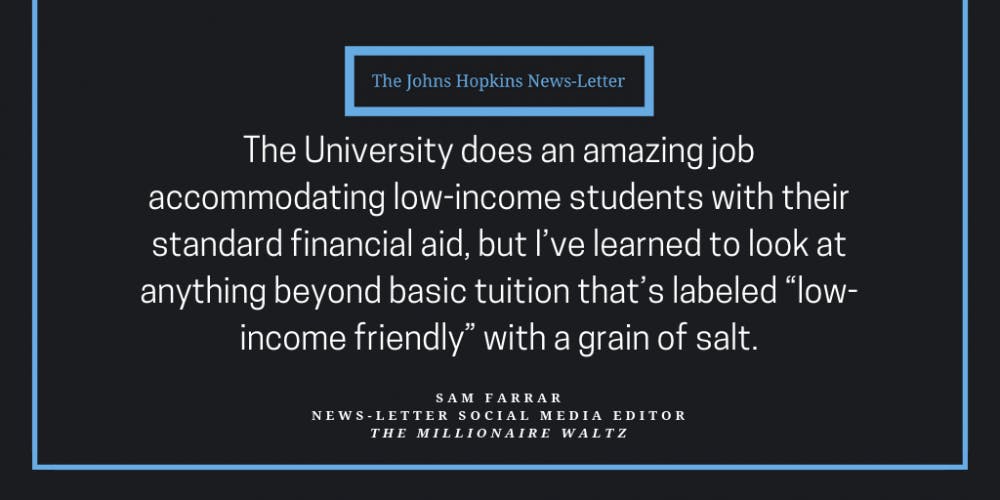
Last spring I was talking to a friend, who has already spent years in Europe and Asia, about all the places we’d like to be able to visit some day.
When I told her that I had never left the country, she looked at me as if I had spoken to her in one of the three languages she doesn’t know.
“You have to study abroad sometime at Hopkins! There are so many opportunities to go anywhere you want,” she said.
“I can’t afford it,” I replied.
“You could use financial aid to pay for a lot of it, and apply for grants for the rest of it. You might even be able to have it completely covered!”
“I can’t afford it.”
“What are you talking about? You can get everything paid for — tuition, housing, travel, literally everything.”
“I can’t afford it.”
Of course, everything she said was in good faith, but she was missing the point. I couldn’t leave my job for a semester; it is my only source of income at Hopkins.
How could I pay for all the stuff you actually study abroad for: the immersion in another cuisine, convention and culture for a carefree semester? Who would hire some monolingual American college kid for four months?
If I studied abroad, even with all expenses paid for, I’d be confined to whatever campus I went to like a prison, leaving only for sustenance and to return stateside via the airport.
Sure, if I really wanted to I could save up for the next two years and spend a semester during senior year somewhere outside the sphere of Hopkins.
But those years of saving would be spent in social exclusion and monetary stress as I watched my single shot at the college experience slip away from me.
For the vast majority of its students, Hopkins provides an academic environment teeming with opportunities to travel the world, experiment with careers and enrich your passions.
However, for those with a largely limited ability to fund anything outside their semesterly bill (low-income students), Hopkins remains reluctant to give grants.
I am a low-income student — a broad term used to describe households whose income is a significantly lower than the median income.
It’s a group that comprises less than 10 percent of the University’s student body, while making up roughly one-third of working families.
According to the New York Times, less than 15 percent of the student body comes from families in the bottom 60 percent of income brackets.
On the other hand, almost one-third of the student body come from families whose income is in the top 10%. It’s a top heavy campus, to say the least.
Thus low-income at Hopkins means a very different thing from government programs’ definition of
“low-income,” and as a result, it’s not always the friendliest place for these students.
The University does an amazing job accommodating low-income students with their standard financial aid, but I’ve learned to look at anything beyond basic tuition that’s labeled “low-income friendly” with a grain of salt.
For example, the first time I saw the price of a summer class — about $3500 for 3 credits — I nearly had a stroke.
But I was told “Never fear! There is financial aid to help low-income families,” so I signed up for a class and applied for aid.
And as the internship application deadlines and cheap state school summer class registration came and went, I waited in anticipation for the notification of my aid to come.
I got the email in late April, and it told me I’d received the maximum reward. Finally!
However, when I looked at the reward, it was... disappointing. The “maximum reward” I received was $1000, not even a third of the cost. I was still on the hook for $2500, roughly 20 times my bill for my entire 31-credit school year and triple my expected contribution.
I had barely been able to save up enough money for housing and food during the spring semester, so I saw no way I could pay the bill. Naturally, I contacted my financial aid advisor, in search of sources of aid or grant money.
“Maybe you should consider paying out of pocket,” he responded.
So, on his advice, I transferred the money from my trust fund to SIS and continued my summer enriching my academic experience.
Just kidding! I canceled the class, desperately tried to find a replacement subletter, and went home with no class, internship nor job for the summer.
As I sat at home looking at manual labor minimum wage jobs on my computer, I watched my friends get ahead in their academics or gain valuable experience in their career paths with wonderful internship or research opportunities.
In my time on Homewood, this has been my experience. The University provides enough aid to distance itself from the financial elitism of other high-ranked private institutions.
But for all the extra things that define the college experience, whether it’s summer classes, studying abroad or anything else, inquiries for aid in funding is met with the look of “Why are you here?”
Would I be happy to have the resources available to me in order to have these experiences?
Absolutely.
Will this solve the ongoing identity crisis of being a lower-class, rural Appalachian kid in a wealthy professional environment?
Well, I don’t think so.
In the end, I’m the one standing in front of the mirror asking myself, “Why are you here?” I don’t have an answer to that question right now, and maybe I never will.





